PEN Journey 44: World Journey Beginning at Home
PEN International celebrates its Centenary in 2021. I’ve been active in PEN for more than 30 years in various positions and now as an International Vice President Emeritus. With memories stirring and file drawers of documents and correspondence bulging, I am a bit of a walking archive and have been asked by PEN International to write down memories. I hope this personal PEN journey will be of interest.
After PEN’s Asia and Pacific Regional meeting in Hong Kong February 2007, I flew to Tokyo for a two-day visit with members of Japanese PEN, along with International PEN board members Eric Lax and Takeaki Hori. We met with Japan PEN’s board, and in the evening I shared a stage and conversation with Mr. Hisashi Inoue, chairman of Japan PEN and one of the country’s well-known playwrights. Part of our discussions explored the possibility of Japanese PEN hosting an International PEN Congress. Only once before, in 1984, was the World Congress held in Japan.
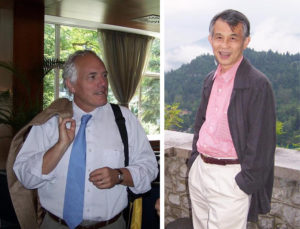
International PEN Board members Eric Lax and Takeaki Hori
Housed in an impressive building in Tokyo, Japan PEN was one of International PEN’s largest and most active centers with one of the more interesting histories. Founded in November 1935 on the eve of a tumultuous period in world affairs, Japan PEN members committed to the PEN ideals of freedom of expression and “one humanity living in peace in one world.” By 1935 Japan had left the League of Nations in the wake of the Manchurian Incident and was moving towards international isolation, a direction that concerned liberal literary figures and diplomats. In this climate International PEN in London, with support from leading novelists, poets and foreign literary figures, reached out and requested that writers in Japan form a PEN Club. Japan’s well-known novelist Toson Shimazaki served as the founding president. As suppression of free speech increased as war in the Pacific broke out and the Second World War advanced, Japanese PEN stayed in limited contact with International PEN in London and provided a unique portal to the world for its writers and citizens during that time.
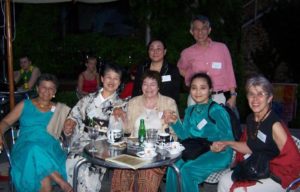
Japan PEN members at PEN’s 71st Congress in Bled: Furukawa Taeko, Miyakawa Keiko and Yonehara Mari, along with Fawzia Assad (Suisse Romand PEN) Huguette de Broqueville (French PEN) and Celia Balcazar (Colombian PEN) and Takeaki Hori (PEN International Board & Japan PEN)
Personally, I remember the hospitality of Japan PEN members who took me out on the Ginza to toast my birthday as I rounded a decade. I had explained that I needed to fly home that evening, a day early to share the birthday. I still remember the glasses of pink champagne flowing up and down the Ginza, (though I was drinking sparkling water), as my own new decade was heralded, then flying halfway around the world and arriving in time to have another dinner that same night with my husband.
Three years later, in September 2010 Japan PEN hosted the 76th PEN International World Congress in Tokyo, one of PEN’s largest with representatives from 90 centers around the theme “The Environment and Literature—What Can Words Do?”
******
World War II, D-Day, the fall of the Berlin Wall—all were global events in the 20th Century which framed the history that followed for much of the world and stirred both despair and optimism among politicians and citizens and inspired stories and poetry among writers. PEN’s Peace Committee conference in March 2007 settled on three themes: Languages under Threat—Dying Cultures, Reading as a Social Event, and Post-Totalitarian Resistance.
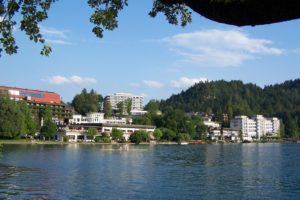
Bled, Slovenia, setting of PEN International Peace Committee meeting, March 2007
In my files I found the keynote paper “Post-Totalitarian Resistance” by Peace Committee Chair Edvard Kovač, a portion of which I quote here. It provokes thought with the kind of open-ended questions that don’t necessarily have answers but can lead to discovery. Contents of PEN’s forums are among its important legacy.
After the fall of the Berlin Wall there was a great deal of hope that the era of totalitarian ideologies was over forever. Fukuyama and others even talked about the end of history. But ideological thinking has settled like sediment in people’s minds and it still persistently, albeit imperceptibly, affects our thoughts, conclusions and decisions.
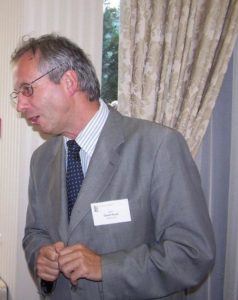
Edvard Kovač, Chair PEN’s International’s Peace Committee, 2007
The role of the writer is to be vigilant and to recognize a transformation in the rigid thinking that until only recently stifled his creativity and pushed him towards dissidence. Perhaps he will notice that the ‘class struggle’ has been transformed and that out of this transformation the germs of new ideologies are emerging: to the legitimate striving for the creation of a Palestinian state a new anti-Semitism has been attached and alongside the right to the existence of the state of Israel the humane protection of civilian population has simply been forgotten. Recognition of and admiration for Third World culture is fortified by anti-Europeanism while a critical attitude to technological civilization confirms the ethno-centrism of the young states. The spread of democracy is confused with domination of the world market and a critical attitude to processes of globalization is interlaced with anti-Americanism. An emphasis on the need for virility conceals a kind of anti-feminism, while the emancipation of women facilitates a new uniformity. The elements of old totalitarianism which have transformed into foundations of new ideologies are harder to unmask as they appear in the name of anti-ideological principles…
…the demise of totalitarianism does not necessarily equate with critical thinking. The defeat of ideologies only creates the possibility of enlightened thinking. In fact, the desire for quick and simple solutions is even greater in post-totalitarian states. Hence the unbearable lightness of new populisms. If in the past it was politics that fully led the economy, it has now come to a complete turnaround so that the economy is stifling political initiative and economic success is putting a noose around the neck of culture and artistic creativity that cannot be marketed…
How can a writer establish a reasonable dialogue when faced with the new fundamentalisms of all colors and creeds?…this new humanism of the pen, which would once again oppose the violence of the sword (which is also the idea behind PEN’s logo) must create new means of expression. So what is the writer’s language in this new struggle?” —Edvard Kovač, Slovene PEN
There are no simple answers to these observations, but the questions continue to be worth asking in PEN’s forums.
Somewhere in the world during most weeks, if not most days, one of PEN’s 150 centers is holding an event or conference and is at work on behalf of writers. For me, the conferences and literary festivals in 2007 included a visit, along with PEN International Executive Director Caroline McCormick to New York to PEN America’s impressive World Voices Festival with over 100 writers from around the globe. The annual World Voices Festival anticipated and informed the launch of PEN International’s own Free the Word! Festival in London in 2008 and in subsequent countries thereafter.
One of the privileges of serving as International Secretary was visiting centers and members around the world though I couldn’t accept all invitations. I regret missing the celebration of PEN’s Global Library launched by members of Slovak PEN. The Global Library gathered books from PEN members worldwide in multiple languages. I missed a conference on freedom of expression and Kurdish literature and a conference in Georgia arranged by Three Seas Writers and Translators’ and the Georgia Writers Union under the auspices of UNESCO, a frequent funder for PEN gatherings. Other International PEN board members and Vice Presidents often did attend as well as the PEN members.
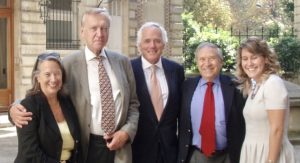
Visit to UNESCO headquarters. L to R: Joanne Leedom-Ackerman (PEN International Secretary), Eugene Schoulgin (PEN International Board Member), Eric Lax (PEN International Board Member), Homero Aridjis (Mexican Ambassador to UNESCO & former PEN International President), Caroline McCormick (PEN International Executive Director)
Following the World Voices Festival, Caroline and I, along with International Board members Eugene Schoulgin and Eric Lax, met with UNESCO officials in Paris where former International PEN President Homero Aridjis was now Mexico’s Ambassador to UNESCO. The meetings at UNESCO headquarters and with Homero and the US representative to UNESCO were in anticipation of the renewal of PEN’s formal consultative relationship and “Framework Agreement” with UNESCO. In the prior agreement PEN had also been recognized as a Category II organization with ECOSOC (United Nations Economic and Social Council.) These agreements were renewed every six years; the relationship continues to this day.
One country in which PEN and UNESCO were active, but not always with compatible agendas was Turkey. Because UNESCO depended on governments for its funding and PEN frequently criticized the Turkish government for its suppression of free expression, we sometimes walked separate paths in Turkey.
The month after the UNESCO meetings I participated in Istanbul in the Forum on Freedom of Expression, sponsored by that independent organization. Along with dozens of PEN members, I had attended the first Forum on Freedom of Expression in Istanbul in 1997 as Chair of PEN International’s Writers in Prison Committee, and I and other PEN members had spoken at many of the biennial meetings since.
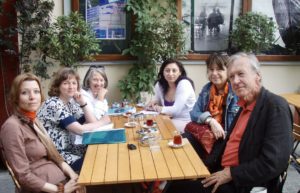
Meeting before Forum on Freedom of Expression in Istanbul. L to R: Novelist Elif Shafak (PEN case at the time), Sara Whyatt (PEN International Writers in Prison Committee Program Director), Joanne Leedom-Ackerman (PEN International Secretary), friend, Journalist Nadire Mater (PEN main case), Eugene Schoulgin (PEN International Board Member)
In Ankara, I was hosted at the International Ankara Short Story Days Festival, an initiative which also aspired to get UNESCO support to establish a World Short Story Day. Professor Aysu Erden, Turkish PEN’s international secretary and editorial board member of PEN International’s Diversity Project of the Translation and Linguistic Rights Committee (TLRC) was a champion of the effort. That year the theme was “Preservation of Multiculturalism and Diversity,” a UNESCO focus as well.
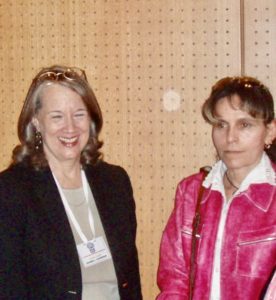
Joanne Leedom-Ackerman with Aysu Erden, Turkish PEN board member
In a visit to a large school in Ankara and at a program later that evening, we considered how people and societies bridged differences, how consciousness could change in societies and how literature and stories could play a role. I reflected on the changes during the civil rights movement in the U.S. where I had grown up.
“Many of the stories in my short story collection No Marble Angels are set in the late 1950’s and 60’s in the American South during a time of upheaval in the United States. It was a time when blacks and whites peered at each other over the barriers of history and laws which separated them,” I told both audiences, aware that in Turkey, Kurds often faced discrimination as did Armenians, and the writers who wrote about this discrimination could face time in prison.
That schism is still one of the U.S.’s major national dramas though much distance has been travelled in my lifetime. The abolishment of the laws of segregation and the opening up of opportunity has strengthened U.S. society immeasurably, though there is still a journey to take. It is the closing of the distance between people which has interested me as a writer over the years, whether the distance arises from race or gender or age or simply from the self looking out into the world and seeing an image other than its own.
One of the books that had an impact on me growing up was written by another Texan who literally changed the color of his skin in an attempt to get inside the experience of being black in the South during the time when racial covenants dictated where a person could get a drink of water or sit on the bus or go to the bathroom. John Howard Griffin’s Black Like Me came out when I was a school girl. I don’t remember if I read the book then, or a few years later, but when I read it, the dilemma it posed both shaped and mirrored feelings and questions which were growing in me. The questions were really questions of the human condition: Who am I? And who is that person who is not me and different from me?
For a time I considered these as political questions. I spent much of my youth debating issues of civil rights with family and friends. I located the antagonist outside myself, as some monolith, which for lack of a better description had a handle at the top, a wing on the west and several large rivers running through it. And so I left the state of Texas.
As long as the antagonist was outside in politics, society, and culture, I could separate myself from it. As a journalist in the Northeastern part of the United States, I gathered facts and statistics and social opinions and searched for answers to issues. I wrote articles on segregation and desegregation and integration of institutions in the United States. All the while other stories were building in me that I wanted to write, stories that couldn’t so easily be contained in facts and figures and social theory. I began a journey of my own, not by changing the color of my skin, but by considering experience from the inside out. I began writing fiction—short stories and novels. My writing changed from the journalistic to the consideration of the individual heart, from the objective to the subjective.
What continues to interest me in writing are the shadowy places in the individual heart, those places which keep us from seeing one another. Sometimes the distance between self and other is measured in terms of race, sometimes age, sometimes gender, sometimes culture, sometimes religion, sometimes country of origin. I’m interested in the way people go about making bridges or tearing them down.
To the extent a multicultural society recognizes the human spirit that connects its citizens at the same time valuing the cultural differences among them, the society progresses. Multiculturalism is at the heart of International PEN, which has 144 centers in 101 countries. PEN is committed to dispelling race, class and national hatreds in an effort to champion one humanity living in peace; PEN is also committed to freedom of expression.
Because we are writers, literature is our means of expression. Literature has an important role in bridging cultures. The first glimpse we have of another culture is often through reading. We let our imagination take an author’s images, scenes, and characters and bind them to our own lives. We draw from books wisdom and experience.
Many of the characters in my short stories are struggling to expand who they are and come out of themselves, to reach across to another person, to enter and occupy that space at the back of the house, that dark, vine-covered, musty room where “the other” lives. Entering that space, one raises the shades and opens the doors and windows and glimpses in the face of the other, a reflection of one’s self.
Next Installment: PEN Journey 45: Dakar—The Word, the World and Human Values
Here is some info about World Poetry Day, which, upon my presentation there, had been accepted -as you will recall. This summary might be functional:
Of World Poetry Day
In 1996, soon after co-founding Poetic Space Lab, I thought: “World Theatre Day, World Music Day… How about World Poetry Day?” And I phoned Professor Talat Halman, who was in New York. “Is there such a day?” “I don’t think so,” he said. So I phoned poetess Gülseli İnal; she also liked the idea. “Let’s choose 21 April,” she said, giving a mythological reason. So as the Poetic Space Lab we celebrated World Poetry Day in Turkey on 21 April 1996. In 1997 Melbourne PEN and Andy Chebanne, an academic -and since then a friend- from Botswana, joined the celebration. Gülseli Inal and I became PEN members. PEN Turkey Centre accepted the idea. That year I presented the idea at the Mediterranean Poetic Conference organized by PEN Turkey. Our international secretary Prof. Suat Karantay helped the proposal to be taken to the agenda of PEN Int’l Congress in 1997.
So I went to Edinburgh and presented the idea of World Poetry Day. It was joyfully and unanimously accepted. The Greek PEN delegate said 21 April would not be good, because in Greece in the1960s there had been a military coup d’etat on that day. Still, World Poetry Day was accepted and was taken to UNESCO. When we asked, we were told that UNESCO was consulting some other literary organizations. More than a year later UNESCO decided to include World Poetry Day on their calendar, but on 21 March. Years later, Yiorgos Chouliaras told me that date was the suggestion of Hellenic Authors’ Society.
In a nutshell, if there is a World Poetry Day on UNESCO Calendar, a fair summary should include the following people and institutions:
Poetic Space Lab -initiated by Tarık Günersel, supported by Gülseli Inal, Prof. Talat Halman and other members of PSL, then accepted by PEN Turkey Centre led by Alpay Kabacalı and Prof. Suat Karantay, Melbourne PEN Centre led by Judith Rodriguez, PEN Int’l led by Int’l President Ronald Harwood and Int’l Secretary Alexander Blokh, UNESCO, where 21 March was preferred to 21 April upon a suggestion of Hellenic Authors’ Society.
The internet was new in 1996, and the proposers did not know that in some countries a WPD had previously been celebrated in early October but the idea had not become globally popular.
A principle of Poetic Space Lab was that a World Poetry Day event should include poems in at least two languages and preferably many more, so that the day cannot be used for chauvinistic aims.
Warm regards and best wishes,
Tarık
Thank you for reminding of that effort and now the fact of World Poetry Day!
Here are some of the things that stood out to me – some are themes already mentioned
-The amazing community of writers around the world. . . no words seem capable of embracing the depth and breadth of that community
-The wrestling with the biggest, most essential questions . . . found the one about the return to fundamentalism especially interesting
-But most interesting were you own words about your own writing . . . I loved it Joanne, and don’t recall such a window into your heart in previous PEN chapters